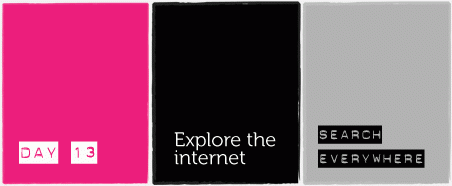
If you use the internet regularly, chances are, you will be searching for information using either Google, Yahoo!, Bing or ASK. Google is by far the most widely used internet search engine all over the world. To the point where we have assimilated it into our everyday language. Want to know something? "Just google it" ;)
This also means that these search engines are effectively the primary gate keepers of content we find online. Each of them employs its own technology to crawl the world wide web, categorise them based on keywords and other relevant information, and rank them according to their own methods of establishing relevance and importance.
Since it would be exceedingly difficult for each individual to perform this search and assessment task every time s/he is looking for something on the world wide web, this is extremely useful. But it's worth reminding ourselves that we don't have to be limited to the gatekeepers we are used to all the time.
We can explore many other ways of categorising and presenting the wealth of information available, and we don't necessarily need to place all of our trust in one particular corporation (or two - Google Inc. and Microsoft Corp. own all three of the major search engines that are currently being used: Google, Bing and Yahoo!).
Also, there are privacy concerns. While we are browsing the net using search engines, they are also collecting information about our online activity - what search terms we use, where we go, identifying information about our hardware etc. Each company has a different policy regarding what information is stored, for how long, for what purposes and so on.
As individual users, we have little control over this. But collectively, we can exercise our power to explore different spaces, choose those that better protect our right to privacy and challenge the dominance of major search engines to define how information should be categorised, weighed and presented to us.
Chart a different journey into the world wide web.
1. Check out different search engines
- What other search engines are available?
- Do a search on your regular search engine. Use the search engines found on the results to search for other ones.
- Ask around if people you know are using different kinds of search engines for different things.
- Are there language or location specific search engines? How about those that index specific types of information like tweets, blog posts or entries from wikipedia? Or search engines that are created for different internet access platforms like mobile phones?
- Share them with other campaigners. Post it as a comment or on Twitter (#takebackthetech).
- Here are a few that we've found that you can start with:
2. Search and assess
- Look for information on violence against women in a few different search engines. Search for the same term in each of them (e.g. cyberstalking, domestic violence shelter etc.)
- How are the search results different? Is the information presented differently? Are the top 5 sites shown different for each of the search engines? Did it look for information from different sources? Does it offer a different additional value to you (e.g. better interface, donation to your selected non-profit cause with each search etc.)?
- Rate and assess them. Which was most relevant to your needs?
- Bookmark the one (or two) you liked the most that is not your usual search engine, and widen your information gatekeepers for next time :)
3. Compare and converse
- Check out the privacy policy of your usual search engine and the one(s) you just bookmarked.
- Which provides you with better control over your personal data, and have greater consideration for your right to privacy?
- Have a look at what kinds of information about you that they store, for how long, whether you are able to access it and request for it to be deleted, who they share it with under what kinds of circumstances etc.
- Start a discussion! Post it up on your blog, tweet about it or leave a comment on this page. Converse about the possible impact of these policies to situations of violence against women. For example, if they do collect information, how does this support investigations for cyberstalking, or leave users more vulnerable to being stalked online?
Take Back The Tech! Shake up the comfort zone. Search everywhere.
- Log in to post comments
